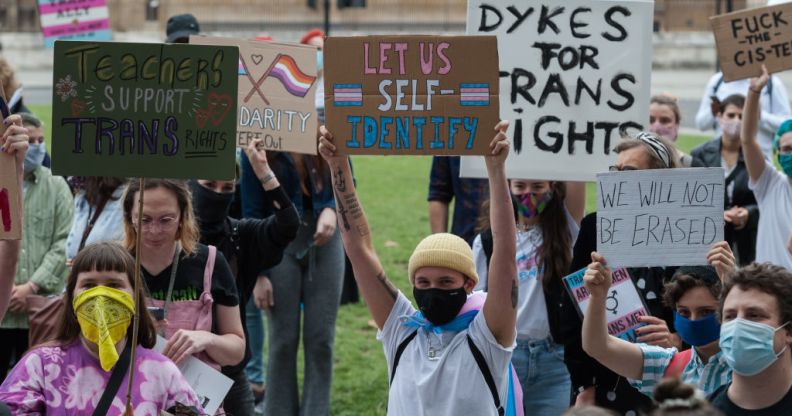1 in 7 trans Britons are refused healthcare by their GP just for being trans

A protestor asks for the right to self-identify their gender in the UK, which was one of the demands campaigners had for reform of the Gender Recognition Act. (WIktor Szymanowicz/NurPhoto via Getty)
One in seven trans people in the UK have been refused healthcare by their GP on account of being trans on at least one occasion, a report has found.
And almost a third – 29 per cent – of trans people have been refused care by gender or sex-specific NHS services because they are trans.
Of those trans people who managed to access general healthcare services, 70 per cent report that they then faced transphobia.
Perhaps unsurprisingly, more than half (57 per cent) of trans people the avoid going to the doctor when they feel ill.
These findings are contained in a report based on a survey of almost 700 British trans people carried out by trans-led organisation TransActual.
The report, “Trans lives survey 2021: Enduring the UK’s hostile environment“, paints a grim picture of life for trans people in the UK today.
Chay Brown, director of TransActual, said: “These findings are shocking but in no way unexpected. They merely put figures to a perilous situation that almost every trans person in the UK is well aware of.
“Transphobia feels unescapable, whether we’re at home, at work or when we go to the doctors.”
Transphobic discrimination in healthcare worse for trans people of colour and disabled trans people
Alongside prejudice and discrimination against trans people trying to access healthcare, problems also persist in the workplace.
In the workplace, high numbers of trans people have experienced transphobia while trying to get a job (63 per cent), or from their line manager or colleagues. Seventy-three per cent of trans men and women have experienced transphobia from their colleagues, as have 80 per cent of non-binary people.
While anti-trans discrimination affects the majority of trans people, for trans people of colour and disabled trans people the situation is even worse. Seventy-three per cent of Black people and people of colour (BPOC) have experience transphobia while seeking employment, and 88 per cent have experienced transphobia from colleagues.
In healthcare, a greater number of disabled trans people reported that healthcare services are inadequate than non-disabled trans people. Sixty per cent of disabled respondents to TransActual’s survey reported experiencing ableism when trying to access trans-specific healthcare services.
Trans people with disabilities are also more likely to experience delayed treatment, with 93 per cent having done so compared with 85 per cent of non-disabled people.
Additionally, 53 per cent of BPOC said they have experienced racism when trying to access trans-specific healthcare services.
Outside of work and healthcare, trans people face other serious issues: 27 per cent of British trans people have been homeless at some point in their lives, rising to 36 per cent of BPOC and disabled trans people.
jane fae, chair of Trans Media Watch, said of the report’s findings that the “real scandal” is “how comprehensively the media have conspired to ignore this situation, preferring, instead, to produce tens of thousands of words on the largely imagined consequences of reform to the Gender Recognition Act”.
fae added: “We are not at all surprised to find that 70% of respondents said that media transphobia has impacted their mental health. In addition, 93% reported that media transphobia had an impact on their experience of transphobia from strangers on the street, while 85% said it has impacted how their family treat them.
“The bottom line is: transphobia impacts all aspects of daily life for trans people, from relationships with our friends and families, to healthcare, and even listening to the radio. This report is essential reading for anyone working in healthcare or in the media, as well as for policy makers and employers, and we hope that it provides food for thought.
“Your actions (and inactions) have a profound impact on all of us.”

